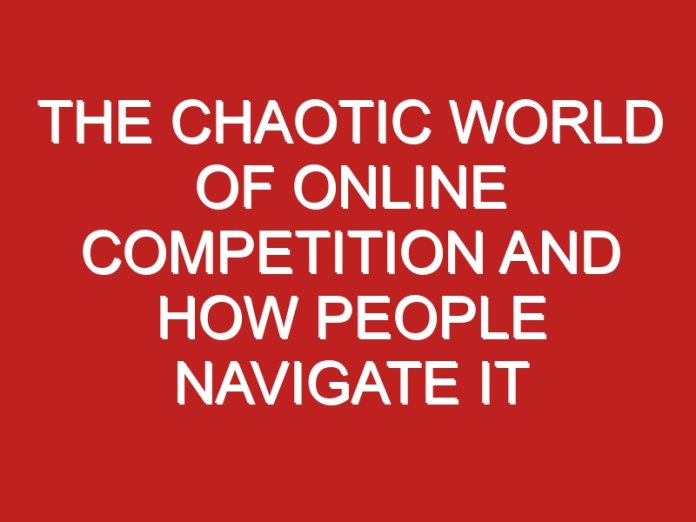The internet has revolutionized the way people communicate, connect, and do business. With the rise of social media, e-commerce, and digital marketing, the competition for attention and engagement has become fierce. In this digital landscape, anyone can create content, start a business, or build a personal brand. However, the ease of access to these opportunities has also resulted in a chaotic and overwhelming world of online competition. The sheer volume of information available and the constant pressure to stand out can create a sense of chaos, confusion, and even anxiety for those trying to navigate the online competition.
In this era of digital connectivity, understanding how people navigate online competition has become essential. Whether you are a business owner, social media influencer, or content creator, the ability to compete online is critical for success. However, the chaotic nature of online competition can be overwhelming, leading to burnout, mental health issues, and lost opportunities. Therefore, understanding how to navigate this landscape can help individuals and organizations develop strategies to succeed in the digital age. By understanding the challenges and opportunities of online competition, individuals can develop resilience, creativity, and authenticity to stand out in a crowded digital world.
The Different Forms of Online Competition:
The online competition takes many forms, depending on the goals and objectives of individuals and organizations. Here are some of the most common types of online competition:
Social media has become one of the primary channels for individuals and organizations to connect with their audiences. As a result, there is intense competition for social media followers and engagement. People and brands compete for likes, shares, comments, and followers, which can increase their visibility and reach on social media. The competition for social media influence and popularity has created a new class of influencers and content creators who specialize in building their social media presence.
The digital marketplace is highly competitive, with thousands of brands and businesses vying for the attention of online shoppers. E-commerce platforms such as Amazon, eBay, and Etsy have made it easier than ever for anyone to start an online store and sell products. As a result, businesses must compete for visibility, credibility, and customer loyalty in a crowded digital marketplace. The competition for attention in the digital marketplace is intense, with brands using various marketing techniques such as SEO, PPC, email marketing, and social media marketing to reach their target audiences.
Search engines like Google have become the go-to source for information for millions of people worldwide. As a result, businesses and content creators compete to rank highly in search engine results pages (SERPs). The competition for search engine visibility is fierce, with businesses investing in search engine optimization (SEO) techniques to improve their website’s ranking in search engine results pages. The higher a website ranks in search results, the more traffic and potential customers it can attract.
In conclusion, the different forms of online competition are diverse and constantly evolving. Understanding the different types of online competition is critical to developing effective strategies to succeed in the digital age.
The Psychological Impact of Online Competition:
Online competition can have a significant psychological impact on individuals, particularly those who are vulnerable or prone to mental health issues. Here are some of the most significant psychological impacts of online competition:
One of the most significant psychological impacts of online competition is the effect of constant comparison. Social media and other digital platforms make it easy to compare oneself to others, particularly in terms of popularity, success, and wealth. The constant pressure to measure up to others can create feelings of inadequacy, low self-esteem, and anxiety.
The anonymity of the internet can bring out the worst in people, leading to cyberbullying and trolling. Online competition can exacerbate these negative behaviors, particularly when individuals feel threatened by others’ success. Cyberbullying and trolling can have a devastating impact on individuals’ mental health, leading to depression, anxiety, and even suicide.
Navigating online competition requires resilience, creativity, and a healthy mindset. Individuals who are prone to mental health issues may find it particularly challenging to navigate the online competition. However, there are strategies that individuals can use to protect their mental health while competing online. These include building a support system, emphasizing authenticity and uniqueness, and seeking professional help if necessary.
Online competition can have a significant psychological impact on individuals, particularly those who are vulnerable or prone to mental health issues. By understanding these psychological impacts, individuals can develop strategies to protect their mental health while competing online. For example, In the casino industry, online competition can have both positive and negative impacts on individuals. On the positive side, online casinos offer a convenient and accessible way for individuals to engage in their favorite casino games from the comfort of their homes. This convenience can save time and money that would otherwise be spent traveling to a physical casino. Additionally, online casinos often offer attractive bonuses and promotions that can increase individuals’ chances of winning and enhance their overall gaming experience.
Because of this, Best online slots real money is an great example of online competition that can have both positive and negative effects on individuals. It is essential to approach online competition with a healthy mindset to reap the benefits without experiencing negative psychological effects.
In the casino industry, online competition can have both positive and negative impacts on individuals. On the positive side, online casinos offer a convenient and accessible way for individuals to engage in their favorite casino games from the comfort of their homes. This convenience can save time and money that would otherwise be spent traveling to a physical casino. Additionally, online casinos often offer attractive bonuses and promotions that can increase individuals’ chances of winning and enhance their overall gaming experience.
However, the online casino industry can also have negative psychological impacts on individuals. For instance, online casinos can create a sense of addiction, leading individuals to spend more time and money than they can afford on gaming. This addiction can lead to financial strain, relationship problems, and a decline in mental health. Furthermore, online casinos can exacerbate gambling problems among vulnerable individuals, such as those with a history of addiction or mental health issues.
To protect their mental health while competing in online casinos, individuals should set limits on their time and money spent gaming, seek support from loved ones, and be aware of the signs of addiction. Additionally, individuals should approach online casinos with a healthy and balanced mindset, recognizing that gambling is a form of entertainment and not a guaranteed source of income or financial security. By practicing mindfulness and self-awareness, individuals can enjoy the benefits of online casino gaming without experiencing negative psychological effects.
Strategies for Navigating Online Competition:
Navigating online competition can be challenging, but there are strategies that individuals can use to succeed in this digital landscape. Here are some effective strategies for navigating online competition:
One of the most effective strategies for navigating online competition is to build a supportive community. A supportive community can provide individuals with encouragement, guidance, and constructive feedback, which can help them improve their skills and stand out in a crowded digital landscape. Joining online forums, Facebook groups, or other online communities can be an effective way to build a supportive network.
In a world of constant comparison, it’s essential to emphasize authenticity and uniqueness. Authenticity and uniqueness can help individuals stand out in a crowded digital landscape and attract a loyal following. Emphasizing authenticity means being true to oneself, sharing one’s unique experiences, and connecting with others on a personal level. Uniqueness means offering something different and innovative, whether it’s a product, service, or content.
Developing resilience and a growth mindset is critical for navigating online competition. Resilience means bouncing back from setbacks, learning from failures, and adapting to new challenges. A growth mindset means embracing challenges as opportunities for growth and development, being open to feedback, and continually learning and improving. By developing resilience and a growth mindset, individuals can overcome obstacles, improve their skills, and succeed in the digital landscape.
In conclusion, navigating online competition requires creativity, resilience, and a healthy mindset. By building a supportive community, emphasizing authenticity and uniqueness, and developing resilience and a growth mindset, individuals can succeed in the digital landscape. It’s important to remember that online competition is a part of the digital age and can be used as an opportunity for growth and development. By embracing the chaos of online competition and using these strategies, individuals can succeed in their goals and achieve success in their desired fields.
Conclusion:
Online competition has become an integral part of the digital age, and it can be both a source of opportunity and challenge. In this article, we have explored the different forms of online competition, its psychological impacts, and strategies for navigating it. Here is a summary of the main points discussed:
Online competition can be overwhelming, and it can have significant psychological impacts such as constant comparison, cyberbullying, and trolling. Navigating the online competition requires creativity, resilience, and a healthy mindset.
Despite the challenges of online competition, it’s essential to embrace the chaos and navigate it with confidence. Online competition can be an opportunity for growth and development, and individuals can use it to improve their skills, connect with others, and achieve their goals.
Finally, it’s essential to share strategies for navigating online competition with others. By sharing experiences, insights, and strategies, individuals can help each other succeed in the digital landscape. Whether it’s building a supportive community, emphasizing authenticity and uniqueness, or developing resilience and a growth mindset, individuals can use these strategies to succeed in online competition.
In conclusion, online competition is here to stay, and it’s essential to develop effective strategies for navigating it. By understanding the challenges, embracing the chaos, and sharing strategies with others, individuals can succeed in the digital landscape and achieve their goals.
A Little Bit of London In Your Inbox Weekly. Sign-up for our free weekly London newsletter. Sent every Friday with the latest news from London!



